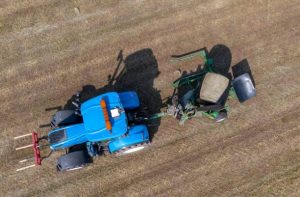The use of silage plastic film in hay baling has several benefits. These include cost savings, reduced air movement, and waterproof protection against rain. Silage film can also be reused multiple times. It is made of high-quality plastic that is reusable and contains no harsh ingredients. Additionally, silage film helps maintain bale freshness and ensures it is ready for animal feed.
It has a waterproof layer
 Silage film has a waterproof layer that can help you wrap your hay bales without losing moisture and nutritional value. In addition, the waterproof layer helps to keep oxygen from entering the bales. Keeping the air out of the bales will help prevent rot and mould.
Silage film has a waterproof layer that can help you wrap your hay bales without losing moisture and nutritional value. In addition, the waterproof layer helps to keep oxygen from entering the bales. Keeping the air out of the bales will help prevent rot and mould.
SilageWrap silage film is a multi-layer product with excellent opacity and puncture resistance. It is designed to withstand baling pressure and is suited for both round and square bales. In addition, the film's waterproof layer helps to protect hay bales from damage from sunlight.
Silage wrap is usually made from polyethylene material and is designed to keep bales dry. Choosing the right bale wrap is important to prevent mould and other bacteria from growing in the bales. You'll also want to pick a material that has a high puncture resistance and is resistant to UV rays.
Another advantage of silage film is that it protects against rain moisture. Hay bales stored in the rain will eventually get slightly damp on the underside of the rain wrap. But the moisture will eventually evaporate, keeping the hay fresh and dry. With these advantages, it's easy to see why silage film is a good choice for hay baling.
Silage film is made from polyethylene, an olefin with long-chain olefins. It has similar linearity to LDPE but differs in its rheological properties. The material is also highly malleable and resistant to punctures.
It reduces air movement
Silage film reduces air movement in a variety of agricultural processes. For example, the hay baling process helps stabilize the bale's density by reducing air movement. It also improves the quality of the forage and reduces waste. In addition, its tight sealing prevents air from escaping, maintains nutritional value and maximizes forage preservation.
Usually, silage is baled in square or round bales. Then, it is wrapped in bale wrap, which is plastic. This film is typically black. It helps prevent clumps of wetter silage, which can result in poor-quality silage.
Once the hay is baled, it is time to move it into storage. In addition, the bale should be tightly sealed with plastic to prevent air escaping. If the bale contains any air, aerobic bacteria will quickly consume it. Without oxygen, anaerobic bacteria multiply and break down plant sugars into lactic or acetic acid.
In addition to reducing air movement, silage film reduces the pH of the forage. The pH of the silage must be between 4.5.5 to prevent bacterial fermentation. By eliminating air movement, the haylage is stabilized and can be stored for long periods without the need for additives.
When used properly, silage film prevents spoilage and increases silage yield. It also reduces wastage, which helps farmers sell more high-quality silage.
It protects silage from rain
Applying silage film to hay baling can prevent the silage from being exposed to rain and sunlight, and it can also help prevent the silage from spoiling. It keeps the temperature at 50 degrees Fahrenheit or higher, which helps prevent the deterioration of the feed. Furthermore, it protects the crop from pests, which can severely damage it.
The film also provides an airtight seal, keeping the silage dry and protected from the elements. It also prevents water from getting inside the hay, which prevents mould growth. Silage film is also much cheaper than polyethylene, making it more cost-effective.
The silage film in hay baling can be applied to individual bales or used in a continuous line wrapper. The film should be thick enough to prevent the bales from bursting, but it should not be too thick. The film should be able to last for at least 12 months in outdoor conditions. The longer the film is applied, the more protective it is.
Silage film is odourless and harmless, so it will not harm your animals or crops. It also contains no chemicals that could harm the feed or the animals. As a result, it is a great option for temporary storage and is cheap and easy to use.
It prevents butyric acid fermentation
If the moisture content in hay baling is too high, butyric acid production will likely occur. However, if silage contains less than 70 percent moisture, butyric acid will not be produced. High moisture content also promotes the growth of clostridial-type microorganisms that will decrease silage quality. Additionally, a high moisture level makes the bales prone to freezing and collecting effluent. In large bales, this could pose problems for silage baling.
The moisture content of a wrapped bale is around 40-55%. Any more than this will result in too heavy bales and may not be palatable. Increasing the moisture content also increases the risk of clostridia spoilage and butyric acid formation. Excess moisture can also cause the bale to freeze, reducing its shelf life.
The fermentation process involves the production of acid by Clostridia spores. These organisms are normally found in soil and manure. These fungi can quickly multiply and consume the remaining plant proteins and sugars when present in silage. In addition, the resulting butyric acid can raise the pH of the silage. As a result, it can reduce its digestibility and reduce feed intake.
The use of plastic wrap is recommended for baling hay. Most major suppliers of plastic wrap offer a guarantee of up to a year, and it contains UV light inhibitors and is puncture and stretch resistant. However, it is not recommended for large bales because it can be difficult to handle large bales.
It improves feed quality
Silage film is a material used to improve the quality of feeds in the hay baling process. It is designed to reduce air content and allow fermentation. The ideal moisture content of the hay is thirty to fifty percent, but if the grass is too dry or wet, the fermentation process may be compromised. Furthermore, a higher moisture content silage offers a wider harvest window than dry hay. In addition, silage wrapping should be performed in dry weather to eliminate oxygen and allow the fermentation process to proceed. The process of wrapping silage in the field can be accomplished by either an in-line or trailed wrapping machine.
The advantages to using silage film are several. First, it is more convenient and reliable than hay and can be harvested much faster. It also requires only one pass with a rake to dry the bale. Moreover, it prevents the grass from undergoing mechanical work that would knock out a valuable leaf and reduce feed quality in the bale.
Silage density depends on many factors, including the crop's species, the cut's length, and the moisture content. It also depends on the type of silo and the methods of filling and compaction. The higher the density, the less air penetration occurs, thus increasing the storage capacity and reducing the cost per ton.
